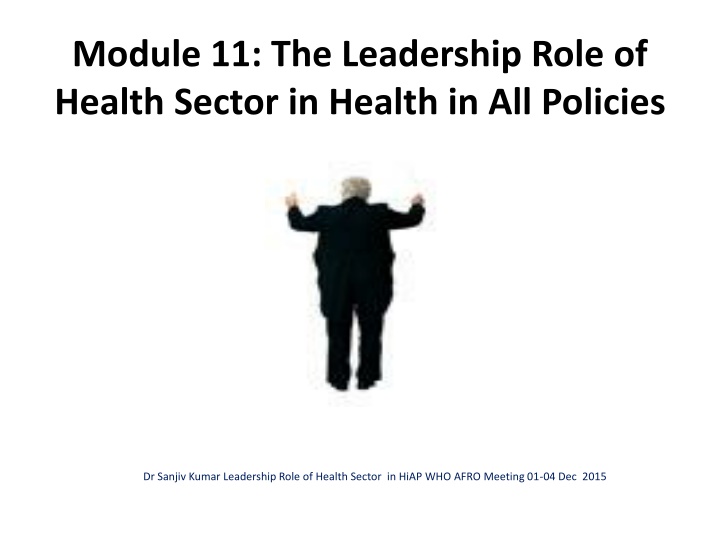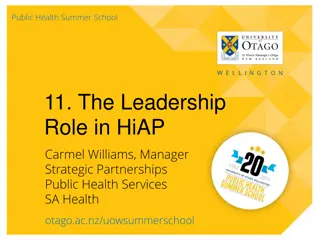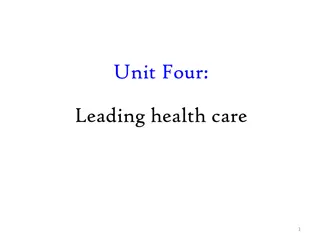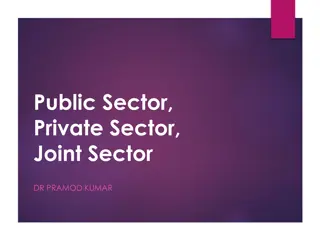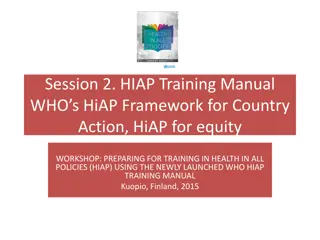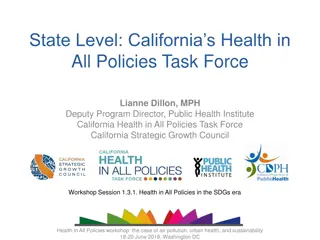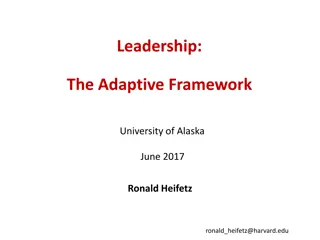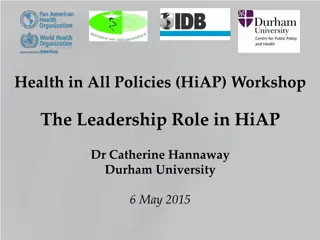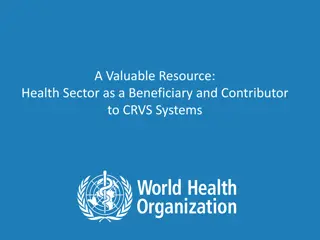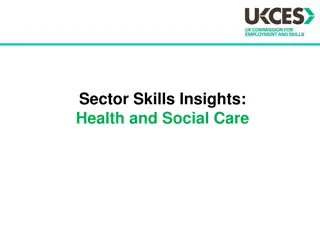Leadership Role of Health Sector in Health in All Policies
The leadership role of health authorities in Health in All Policies (HiAP) involves collaborating with various stakeholders, managing competing interests, promoting social determinants of health, and addressing challenges like political commitment and limited resources. The World Health Organization plays a crucial role in supporting policies for health promotion and providing technical assistance for HiAP implementation.
Uploaded on Oct 01, 2024 | 3 Views
Download Presentation

Please find below an Image/Link to download the presentation.
The content on the website is provided AS IS for your information and personal use only. It may not be sold, licensed, or shared on other websites without obtaining consent from the author.If you encounter any issues during the download, it is possible that the publisher has removed the file from their server.
You are allowed to download the files provided on this website for personal or commercial use, subject to the condition that they are used lawfully. All files are the property of their respective owners.
The content on the website is provided AS IS for your information and personal use only. It may not be sold, licensed, or shared on other websites without obtaining consent from the author.
E N D
Presentation Transcript
Module 11: The Leadership Role of Health Sector in Health in All Policies Dr Sanjiv Kumar Leadership Role of Health Sector in HiAP WHO AFRO Meeting 01-04 Dec 2015
Learning Objectives Explain the leadership role of Health Sector in HiAP Describe role of WHO and other partners Apply the knowledge & Skills by outlining a contemporary Health ministry Identify key skills for Health professionals for promoting HiAP Dr Sanjiv Kumar Leadership Role of Health Sector in HiAP WHO AFRO Meeting 01-04 Dec 2015
Major roles of health authorities in HiAP Government has ultimate responsibility for health of the people Health authorities (professionals) are key actors Evidence based identification, definition & prioritization of health issues Use/Establish mechanisms of dialogue across government & whole of society Implement, monitor & evaluate policies & their implementation Dr Sanjiv Kumar Leadership Role of Health Sector in HiAP WHO AFRO Meeting 01-04 Dec 2015
Role of Health Authorities Collaborate & Partner with other ministries, stake holders & CSOs Strengthen capacity to use & generate evidence Promote understanding of social determinants of health and health inequity Manage, negotiate competing interests Support development, implementation, monitoring & evaluation of HiAP Dr Sanjiv Kumar Leadership Role of Health Sector in HiAP WHO AFRO Meeting 01-04 Dec 2015
Challenges Access to & ability to influence politicians Political commitment and discontinuity Politicization of bureaucracy & corruption Difficulty in gathering and disseminating evidence Limited resources including leadership skills among public health professionals Dr Sanjiv Kumar Leadership Role of Health Sector in HiAP WHO AFRO Meeting 01-04 Dec 2015
Role of WHO Brings Health consideration into global, regional & national policy making Support policies for health promotion & protection Share good practices and lessons learned Technical assistance to countries for HiAP Capacity building of health professionals & civil servants Dr Sanjiv Kumar Leadership Role of Health Sector in HiAP WHO AFRO Meeting 01-04 Dec 2015
Leadership among Health Professionals Jim Collins 5 levels of Leadership Dr Sanjiv Kumar Leadership Role of Health Sector in HiAP WHO AFRO Meeting 01-04 Dec 2015
Keeps an eye on external world and benefiting the society: Keeps in touch with what is happening in the external environment. Ensures that the organization contributes to the good of the society through its products and social welfare activities Enables the organization by developing individuals Execution of the vision by coaching, Motivation, Delegation, right person in right job, see their role in the vision The Leader has vision, charisma, integrity, self awareness, strong commitment and change, social, emotional and intellectual intelligence The Three Circles Leadership Model (Ref Kumar S, Adhish VS, Deoki N. Making sense of theories of leadership for capacity building. Indian J Community Med 2014;39:82-6.) Dr Sanjiv Kumar Leadership Role of Health Sector in HiAP WHO AFRO Meeting 01-04 Dec 2015
The Skills required for Pursuit of Health in All policies or Happiness
1. Listening Skills Most people do not listen with the intent to understand; they listen with the intent to reply. Stephen R. Covey, The 7 Habits of Highly Effective People: Powerful Lessons in Personal Change Dr Sanjiv Kumar Leadership Role of Health Sector in HiAP WHO AFRO Meeting 01-04 Dec 2015
Dr Sanjiv Kumar Leadership Role of Health Sector in HiAP WHO AFRO Meeting 01-04 Dec 2015
Seven simple ways to enhance listening 1. Face the speaker 2. Maintain eye contact 3. Focus solely on what the speaker is saying 4. Keep an open mind 5. Avoid tell the speaker how you handled similar situation 6. Even if speaker is complaining, wait until he finishes 7. Engage yourself Dr Sanjiv Kumar Leadership Role of Health Sector in HiAP WHO AFRO Meeting 01-04 Dec 2015
2. Advocacy Skills The act of pleading or arguing in favour of something Highlights to change the what is into a what should be A process by an individual or group which aims to influence policy and resource allocation decisions within political, economic, and social systems and institutions Advocacy can include many activities that a person or organization undertakes including media campaigns, public speaking, publishing research etc Dr Sanjiv Kumar Leadership Role of Health Sector in HiAP WHO AFRO Meeting 01-04 Dec 2015
Documents for advocacy Press Release Fact Sheet Power Point Website/Internet Television/ Radio spots Article in newspapers Article in magazines Research Update Abstract Policy Brief Talking Points Research Summary Report Publication in Journal and many others... Dr Sanjiv Kumar Leadership Role of Health Sector in HiAP WHO AFRO Meeting 01-04 Dec 2015
KEY ACTORS Think Tanks Policy Champions Peers Bureaucracy Media Civil Society Political Class Judiciary Dr Sanjiv Kumar Leadership Role of Health Sector in HiAP WHO AFRO Meeting 01-04 Dec 2015
Techniques and Tactics Advocacy techniques and tactics Sensitization Audience/Stakeholder Category Beneficiaries Partners Adversaries Decisionmakers Mobilization Dialoguing Debating Negotiating Lobbying Petitioning Pressuring Dr Sanjiv Kumar Leadership Role of Health Sector in HiAP WHO AFRO Meeting 01-04 Dec 2015
When Opportunity Knocks A one-minute message includes: 1. The statement of the issue 2. Evidence to support the issue 3. An example of the problem 4. The desired policy action Ideally, only one main point should be communicated (or, if that is not possible, two or three points at the most) Dr Sanjiv Kumar Leadership Role of Health Sector in HiAP WHO AFRO Meeting 01-04 Dec 2015
3. Networking Skills What is networking Cultivation of productive relationships for employment or business A force multiplier in advocacy efforts to achieve professional and personal goals In today s world Virtual Networking: Various professional and social networking sites need to be used effectively to reach out those in your contact easily and fast to communicate and mobilize like-minded persons and groups Face to face networking: strong way of making new contacts and effectively maintaining old contacts Dr Sanjiv Kumar Leadership Role of Health Sector in HiAP WHO AFRO Meeting 01-04 Dec 2015
Forms of Networking Form Operational Personal Strategic Characteristics Purpose Work done effectively personal & professional development Future priorities and challenges Temporality Mainly internal Current demand Mostly external Internal & external, future oriented Context Prescribed by task Prescribed by task Strategic context and environment Network Attributes Depth Breadth Leverage Key Behavior Building strong relationship Contacts & referrals Inside & outside linkages Source: Three Forms of Networking, Ibarra H and Hunter M Hon, Leaders Create and Use Networks, HBR Jan 2007. Dr Sanjiv Kumar Leadership Role of Health Sector in HiAP WHO AFRO Meeting 01-04 Dec 2015
4. Emotional Competencies Emotional Intelligence (Salovey & Meyers) a type of social intelligence that involves the ability to monitor one s own and others emotions, to discriminate among them, and to use this information to guide one s thinking and actions 4 X more important than IQ in determining professional success High emotional intelligence has a relationship to strong job performance Dr Sanjiv Kumar Leadership Role of Health Sector in HiAP WHO AFRO Meeting 01-04 Dec 2015
5. Working with Difficult Persons/Behaviors A difficult person is anyone who causes irritation, upset, stress or anxiety It is difficult behavior rather than person There are three levels of difficult persons: I. Difficult some of the times. includes almost everyone II. When a person s behavior affects more than one person on a regular basis III. Include persons who purposely hurt or harm others through their behavior Dr Sanjiv Kumar Leadership Role of Health Sector in HiAP WHO AFRO Meeting 01-04 Dec 2015
Three skills to deal with difficult Persons 1. Keep your focus on the problem and not on the person, otherwise, even non issues will become issues 2. Agree with the person what are the issues that need to be addressed. Focus your conversation on logic and issues 3. Look for option agreeable to both of you Dr Sanjiv Kumar Leadership Role of Health Sector in HiAP WHO AFRO Meeting 01-04 Dec 2015
Sum up 1. Health Sector professionals have to take a leadership role for leading HiAP 2. Challenges in leading HiAP 3. WHO is committed to support country efforts to promote HiAP 4. Five main skills for Health professionals for promoting HiAP Dr Sanjiv Kumar Leadership Role of Health Sector in HiAP WHO AFRO Meeting 01-04 Dec 2015
Thank You Dr Sanjiv Kumar Leadership Role of Health Sector in HiAP WHO AFRO Meeting 01-04 Dec 2015
